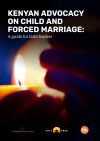Kenyan advocacy on child and forced marriage
A guide for faith leaders.
‘Kenyan advocacy on child and forced marriage: A guide for faith leaders’ from Walk Free, Global Freedom Network, and the Inter-Religious Council of Kenya provides practical guidance to empower faith leaders to conduct advocacy to strengthen responses to forced and child marriage in Kenya.
The guide has been developed in consultation with theologians and faith leaders. Key advocacy messages that draw on Christian, Hindu, and Islamic teachings are highlighted throughout the guide to support faith leader advocacy.
Key Advocacy message:
All major faiths prohibit slavery – everyone has a responsibility to identify and discourage modern slavery, including child and forced marriage.
In Christianity, the Bible says:
“But if out in the country a man happens to meet a young woman pledged to be married and rapes her, only the man who has done this shall die. Do nothing to the woman; she has committed no sin deserving death. This case is like that of someone who attacks and murders a neighbour.”
(Deuteronomy 22:25-26 NIV)
In Islam, the Quran demands action against the oppressor, just like perpetrators of early and forced marriages, Prophet Muhammad SAW said:
Narrated Abdullah Ibn Abbas
“A virgin came to the Prophet (PBUH) and mentioned that her father had married her against her will so the Prophet allowed her to exercise her choice.”
(Abu Dawood 2091)
The Hindu religion encourages parents to support the girl in choosing her husband:
“King Janaka of Mithila organized a grand swayamvara of his beautiful daughter, Sita. A swayamvara was a ritual where kings and princes from far and near would visit the king’s court to ask for the princess’s hand, but only the bravest would be selected. King Janaka announced that he had a mighty bow, which was blessed by Shiva. The one who could string the bow would marry Sita. Many princes tried but all failed. Nobody could even move the bow. Rama and Laxmana were also present. All eyes went to Rama, when his turn came. Rama easily lifted the bow with one hand and strung it with a thunderous twang. The bow broke into pieces. Then, Sita walked up to Rama and garlanded him. The wedding was celebrated with great joy.”
(Ramayana- Sita Swayam Var)
The guide examines the nature of child and forced marriage in Kenya, outlines current gaps in the national response, highlights opportunities for faith leader advocacy, and provides advocacy strategies and tools to support advocacy efforts.
Faith leaders are uniquely placed to make a difference – as custodians of their faiths and pillars of the communities they serve, faith leaders can play a vital role in raising awareness and transforming attitudes to engender lasting positive change. Faith leaders are encouraged to use this guide to conduct advocacy to enhance protections and strengthen the response to child and forced marriage in Kenya.
A shortened version of this guide will be available in the Faith For Freedom app. The app is free to download now from Apple’s App Store and Google’s Play Store. Visit faithforfreedom.org to learn more.










